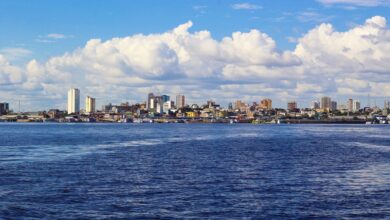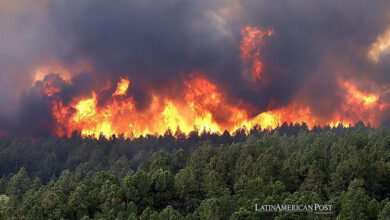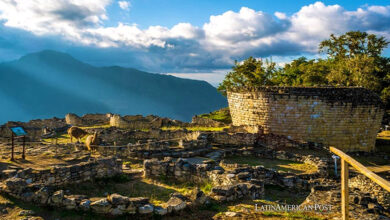IPCC: The Survival Guide for Humanity
On Monday, March 20, the final installment of the IPCC Sixth Assessment Report was launched. Get to know some reflections and critical facts about this important document.

Photo: Freepik
LatinAmerican Post | María Fernanda Ramírez Ramos
Listen to this article
Leer en español: IPCC: la guía de supervivencia para la humanidad
On Monday, March 20, the final delivery of the Sixth Assessment Report (AR6) of the Intergovernmental Panel on Climate Change (IPCC) was launched. This report presents a synthesis of the work that 782 scientists have done for eight years on the physical science of climate change, the impacts, adaptation, and vulnerability to climate change, and climate change mitigation. This is the complete scientific evaluation, a "survival manual for humanity," as the United Nations Secretary-General defined this report. In his presentation, he added that it contains the information to guide defusing the climate change bomb.
The Intergovernmental Panel on Climate Change (IPCC) is a scientific body of the UN in charge of evaluating the scientific, technical, and socioeconomic knowledge on climate change, its causes, impacts, and possible solutions. Since its founding in 1988, the IPCC has published several assessment reports used as the scientific basis for international climate negotiations and political decision-making worldwide. The work of the IPCC is vital because it provides policymakers and society with a clear and objective understanding of the state of the science of climate change and the risks it poses, enabling them to take informed action to mitigate and adapt to its effects.
We recommend you read: Willow Project: US government approved a mega-project to extract oil and gas in Alaska
In recent years, this group has delivered various reports that have alerted us to the actual situation in the fight against climate change, which is more threatening than previously thought. This latest IPCC report, prepared by 93 experts, emphasizes that more than 40% of the global population lives in areas with high vulnerability to climate change. The outlook is bleak. However, with absolute commitment, it is still possible to have hope. Here are some of the most pressing takeaways and challenges:
We Face an Unprecedented Challenge
One of the most widely spread myths, beliefs, or lies regarding climate change is that humanity has already suffered warming and environmental crises and that this is just one more. However, the magnitude of the situation we are experiencing today is unmatched. It has happened in an accelerated way. "With a global temperature increase of 1.1 degrees Celsius (2 degrees Fahrenheit), changes in the climate system that have been unprecedented for centuries or millennia are now taking place in all regions of the world," said the World Resources Institute in this regard. "Global surface temperature has warmed since 1970 at a faster rate than in any other 50-year period in the last two millennia," concludes this latest IPCC report.
This IPCC report points out that the adverse impacts of global warming are far more extreme and far-reaching in scope than previously believed. The temperature has increased by 1.1 degrees, and consequences such as seasonal changes and increased natural disasters can be seen. However, allowing the 1.5-degree barrier to be breached could have devastating consequences. For example, the permafrost in the Arctic could melt or trigger animal and plant specy's mass extinction. Likewise, there would be parts of the world where conditions would be too extreme to live, and diseases and viruses would appear more frequently. The experts of the IPCC estimated that with the policies in force by 2020, an average global warming of 3.2 °C would be reached in 2100.
ABC to Deactivate the Climate Bomb: Seven Critical Years
It is urgent to straighten the course, there is less and less room for maneuvering, and we are all inside the boat. This analogy perfectly shows what is happening in the fight against climate change. Determined, fast, and global actions are required. The positive thing is that there is still hope of having a future in which it is possible to live with well-being. However, it will be an obligation to adapt to new dynamics. The following seven years (until 2030) are fundamental, and what is done in them will have an impact for thousands of years, says the IPCC.
Green Peace, commenting on the IPCC report, notes, "We must quickly phase out fossil fuels: The fossil infrastructure we already have is too much, so you can't start building additional new ones." Furthermore, the report notes that "the large-scale deployment of carbon capture and storage is unproven, and relying on such technology to limit warming to 1.5ºC carries enormous risk." That's why you can't wait for magical solutions or slow transitions. It will help if you run now.
This was precisely another of the conclusions of the IPCC since it indicates that the plans of many countries must urgently move to the implementation phase and not just remain in the future projection. Said future is only guaranteed if it is executed now. In other words, the planning and modeling phase is running out. However, joint efforts are needed so that differences in climate injustice leave behind no countries.
While banks, oil and mining companies, and agribusiness oligopolies are making exaggerated profits, the fight against climate change must catch up on funding. Likewise, the most vulnerable people are the ones who suffer the worst from the consequences of climate change. More incredible determination is needed for States to assume their commitments to achieve a fast, fair, and socially responsible energy transition. The only solution for society is to put life at the center of all consideration. The cards and information are laid out on the table, as are possible solutions.




